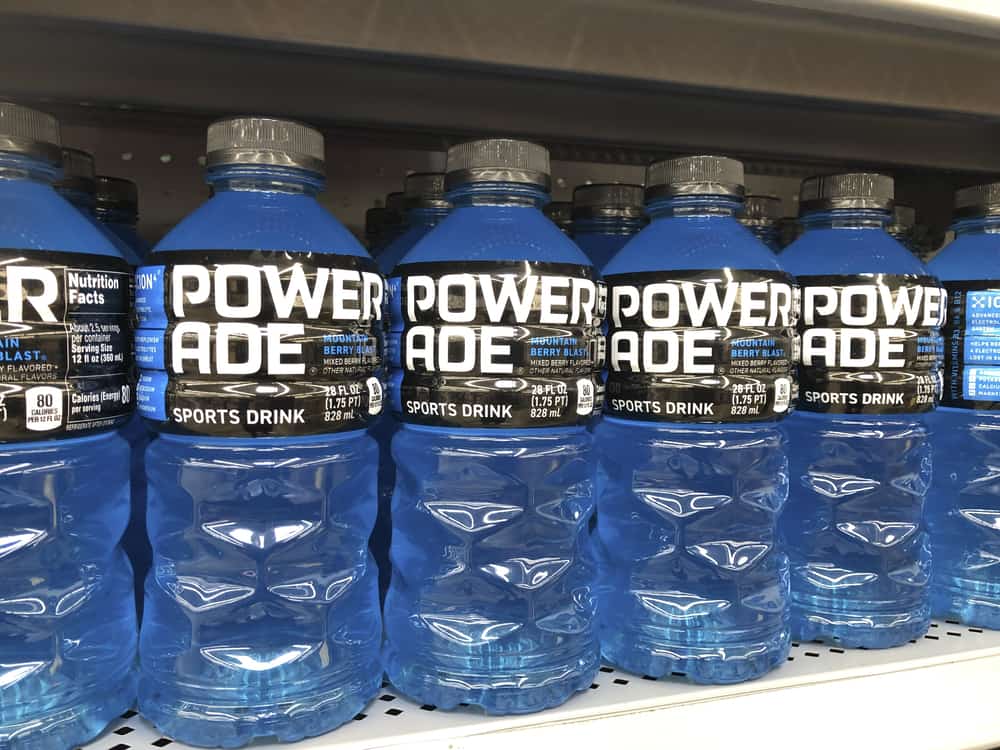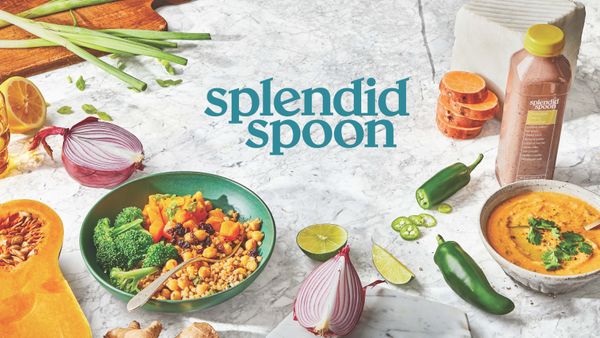We all want a bit of oomph from our drinks, but can a vegan turn to Powerade when they need a boost? The truth is it depends.
There are questionable ingredients, and we are going to take a closer look and see if there are better alternatives if Powerade is not suitable for a plant-based diet.
Powerade Ingredients
Sometimes it is hard to tell if a product is vegan, even with the ingredients laid out before you. The way they are labeled is one thing, but the way they are sourced can be problematic.
Strict vegans will want to avoid certain ingredients that others will find acceptable, and Powerade has more than one controversial ingredient. The Mountain Berry Blast flavor contains the following:
WATER, HIGH FRUCTOSE CORN SYRUP, LESS THAN 0.5% OF: CITRIC ACID, ELECTROLYTES (SALT, MAGNESIUM AND CALCIUM CHLORIDES, MONO-POTASSIUM PHOSPHATE), NATURAL FLAVORS, MODIFIED FOOD STARCH, CALCIUM DISODIUM EDTA (TO PROTECT COLOR), MCT, SAIB, VITAMINS B3, B6, B12 (NIACINAMIDE, PYRIDOXINE HYDROCHLORIDE, CYANOCOBALAMIN), BLUE 1.
The ingredients differ per flavor, and by the country, they are produced in. None of the ingredients is animal-derived, which would instantly make many people think it is vegan. This is not true.
The following ingredients help explain why:
Natural Flavors
These are controversial because the description is so vague. As a conscious consumer, any vegan will want to know whether it is derived from animals or plants. The fact is, it could be either.
Unless specified on the company’s FAQ page, these flavors might not be vegan-friendly. They are often used to make a product unique, but many vegans could be unknowingly drinking sodas made with animal-derived ingredients.
The FDA doesn’t require companies to reveal the specifics and it can be encompassed by the following statement on their website:
“The term artificial flavor or artificial flavoring means any substance, the function of which is to impart flavor, which is not derived from a spice, fruit or fruit juice, vegetable or vegetable juice, edible yeast, herb, bark, bud, root, leaf or similar plant material, meat, fish, poultry, eggs, dairy products, or fermentation products thereof.”
Artificial Colors
With a long history of animal testing, artificial colors are another controversial ingredient that can make a product non-vegan for many. Most Powerade flavors contain artificial colors so it appears you cannot easily get away from them.
When artificial colors are tested on animals, it can cause physical and mental pain. Two common artificial colors used in Powerade are Red 40 and Blue 1.
Red 40 was tested on animals as recently as 2018, and Blue 1 is also a common ingredient known for its background as part of animal testing.
Not every vegan avoids them, but it is easy to see why many do.
Sucralose
Essentially this is a form of sugar, one that is synthetic and made from table sugar.
It is not animal-derived, but there are many cases where sugar is bleached to make it a more desirable white using bone char.
Made from cattle or pig bones, it is imported to the US and used by many sugar suppliers. A lot of brands will be vague when asked about whether or not their sugar has gone through such a process, saying they have multiple suppliers.
To be considered vegan, sugar should not be processed using bone char, but the supply chain is hazy.
Sugar that is made from beets or coconuts, and organic sugar will not have gone through this process. It is not easy to determine whether or not Powerade uses bone char or not.
There are also questions of ethics as sucralose has been tested on so many animals that it is estimated that over 12,000 animals have died as part of testing.
Glycerol Ester of Wood Rosin
Not an ingredient you will find in every Powerade flavor but one a vegan will want to avoid. An oil-soluble food additive used as a stabilizer, it is used to help keep oils in suspension in water.
When it is derived from longleaf pines, it is vegan, but the issue is with transparency. Glycerin can be derived from animal fats which can make it a tricky ingredient. Once again, Powerade does not specify.
How Is Powerade Made?
The popular sports drink is made by Coca-Cola and is packed full of electrolytes designed to aid hydration and increase sports performance.
When energy is waning, the ingredients are designed to help keep you going. Some may consider it a sports drink because of its hydration boasts.
If you are looking for something less controversial from a vegan viewpoint, the following brands and products can offer something different:
Vegan Alternatives
Virtue Clean Energy
To give you a boost, the natural ingredient combines with a caffeine kick using the following ingredients:
Sparkling water, erythritol, natural berry flavors, agave nectar, tartaric acid, stevia leaf extract, green coffee bean extract, vitamins (B3, B6, B7, B12)
Vegans will like that it does not contain questionable ingredients whilst containing the same caffeine as a cup of coffee.
Aspire Healthy Energy Drink
Available in a variety of flavors, it contains no artificial colors. Although it shares some of the same ingredients as Powerade, it does claim to be vegan.
Vitamin C, Vitamin B6, Vitamin B12, Biotin, Calcium D Pantothenate (B5), Niacin (B3), Green Tea, Guarana Seed Extract, L-carnitine, Ginger Root, Natural Flavor, Taurine, Natural Caffeine, Sucralose, Carbonated Water, Citric Acid, Fruit and Vegetable Juice for Color, Sodium Citrate, Choline Bitartrate, Malic Acid, Calcium Lactate.
Buffalo Energy Drink
A simple ingredient profile from a brand that says the product is vegan. Made with Swiss quality and taurine free, the ingredients are as follows:
water, sugar, carbon dioxide, acid: citric acid; acidity regulator: sodium citrates; flavoring, guaranà extract, caffeine (0,032%), color: E150c.
Final Word
Whilst Powerade is no different from most of the energy drinks in terms of being controversial, it is still one that most vegans will need to have a long think about before trying.
There is no escaping the fact that supply chains are not transparent. The question of ethics around artificial colors among other ingredients is also going to be problematic.



